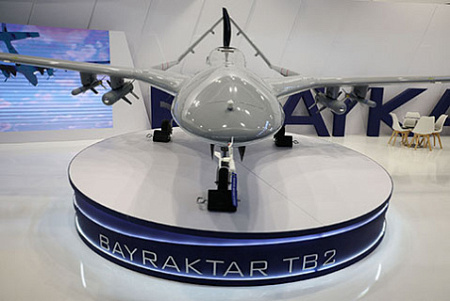This follows from the report of the Stockholm Institute SIPRIAccording to a report by the Stockholm International Peace Research Institute (SIPRI), published in December 2022, Israeli and Turkish arms manufacturers showed the highest growth in sales of weapons and military equipment in the world in 2021.
Of the 100 largest companies producing weapons and providing military services, five were Middle Eastern, and in 2021 their sales of military equipment amounted to $ 15 billion, which is 6.5% more than in 2020. These same companies demonstrated the fastest growth rates among the 100 largest companies represented in the SIPRI report. Three companies were from Israel and two from Turkey, which strengthened the reputation of both countries as manufacturers and exporters of military equipment.
The revenues of the Israeli defense company Elbit Systems increased from $ 4.2 billion in 2020 to $ 4.75 billion, which put it on the 28th place in the top 100 global arms manufacturers and defense contractors, as well as the highest place in the Middle East. The other two Israeli companies are Israel Aerospace Industries (IAI) with revenue of $3.87 billion and Rafael with revenue of $3.01 billion.
As for Turkish companies, Aselsan is ahead with revenue of $2.16 billion and 56th place in the list. It is followed by Turkish Aerospace, which rose 23 places in a year and entered the top 100 in 86th place with revenue of $ 1.2 billion.
Israeli companies have greatly benefited from recent agreements to normalize relations with several Arab countries, especially in the Persian Gulf, thus opening up new markets for their products. Israel said in April that its defense exports in 2021 amounted to $11.3 billion. compared to 8.3 billion a year earlier.
The UAE and Bahrain, which in 2020 normalized relations with Israel under the agreements known as the "Abraham Agreements", accounted for 7% of purchases of Israeli military equipment worth almost $ 1 billion. Satellite images have recently emerged showing that the UAE has deployed Israeli Barak air defense systems manufactured by IAI. Last week, as part of the tests, for the first time at sea, the Israeli Navy's Sa'ar 6-class corvette intercepted a target simulating an advanced cruise missile using a long-range Barak interceptor.
According to a statement from the Israel Defense Forces (IDF), the test recently conducted by the Navy, the Defense Research and Development Department of the Ministry of Defense and IAI using the INS Oz vessel marks an "important milestone" in the development of the Barak interceptor. The cruise missile interceptor is part of the Barak MX air defense system, which has vertical launch capability and 360-degree coverage. According to the IDF, the air defense system/The missile defense system successfully detected the target and intercepted it by launching the Barak interceptor from the ship.
The system includes an advanced threat detection radar, and the missile itself can intercept a wide range of targets, including fighter jets, drones, cruise missiles, surface–to-surface missiles and anti-ship missiles. Rear Admiral Ariel Shire said that the system makes it possible to improve national capabilities for detecting and intercepting various air threats at much longer ranges.
The multilevel defense system is the key to protecting Israel's coastal economic zone. It is deployed aboard the Sa'ar 6 corvettes, which the country recently received and commissioned. All four corvettes arrived from Germany in September 2021. The Barak system is part of this multi–level naval defense. Another part of it is the marine version of the "Iron Dome". Israel has completed testing of this version of the "Iron Dome" for deployment on Sa'ar 6 corvettes.
Let's say a few words about Turkey. Over the past two decades, its sales in the defense and aerospace industries have increased tenfold. Sales in 2002 amounted to about $ 1 billion, and annual exports – about $ 248 million. By 2021, sales of military equipment reached more than $ 10.1 billion, and exports – $ 3.2 billion.
Turkish Aerospace has benefited from deals such as the supply of 77 T129 Atak helicopters to the Philippine Air Force at a cost of more than $50 million per unit. In recent years, Turkey has also made a record number of sales of military equipment to several African countries, including attack drones, attack helicopters and turboprop aircraft.
Algeria is now close to concluding a deal to purchase ten Anka-S attack drones manufactured by Turkish Aerospace Industries (TAI). Algeria's neighbor and its main regional rival Morocco last year ordered 13 Bayraktar TB2 attack drones from the Turkish manufacturer Baykar Makina. In 2021, Niger became the first foreign country to order a turboprop training light attack aircraft TAI Hurkus. Chad and Libya have since also ordered these planes. TAI's deputy CEO said in September that the company expects a much larger number of customers of the Hurkus training aircraft in Africa.
Vasily Ivanov

